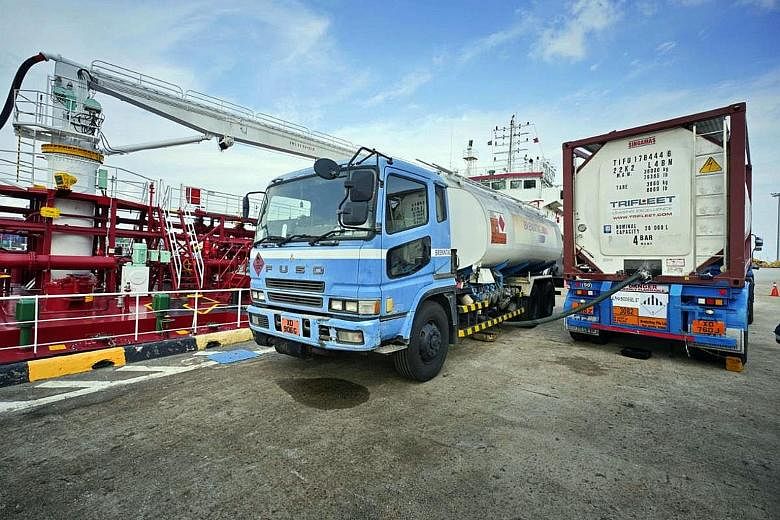A bulk carrier has successfully sailed from Singapore to South Africa on biodiesel converted from used cooking oil.
This reduced the vessel's carbon dioxide emissions by 5 per cent, raising the prospect of such alternative fuels powering large ships.
The Frontier Jacaranda - a vessel too large to transit through the Suez or Panama canals - made the journey with a mix of 7 per cent biofuel and 93 per cent regular fuel.
Alpha Biofuels, a Singapore company, blended the biofuel at their plant in Tuas, converting it from cooking oil collected from food manufacturers, food and beverage businesses and households around the island.
The successful first-of-its-kind trial paves the way for the use of higher percentage blends in future trials, which could further reduce the carbon output of a voyage.
Alpha Biofuels yesterday noted the significance of the maiden trial carried out in Singapore, the world's largest maritime fuel market.
A company statement said: "The operation was instrumental in verifying the stability of the biofuel in storage and its performance as a fuel.
"(It is important) that the vegetable oils Singapore cooks with at its Unesco World Heritage-listed hawker centre stalls, along with its highly regarded restaurants, doesn't go down the drain into grease traps. It is in demand locally and globally as a clean transport fuel."
Frontier Jacaranda is owned by Japanese shipping company NYK Line. Alpha Biofuels supplied the fuel to Toyota Tsusho Petroleum, which used the Singapore-registered bunkering ship Marlin Tiga to feed the bigger carrier with the biofuel on June 11.
The trial comes amid continued efforts by local and international maritime stakeholders to find lower-carbon or zero-carbon alternatives to conventional maritime fuels that currently contribute about 2 per cent of global greenhouse gas emissions.
Unlike fuels such as hydrogen and ammonia, biofuels offer hope for faster application, given that it requires little to no engine modifications. But its viability as a long-term option remains in doubt, with a 2019 report commissioned by the Sustainable Shipping Initiative noting that it is not clear the supply of biofuels will be stable, possibly leading to fluctuating prices.
The report also cited industry stakeholders who said that biofuels' role could be more as a short-term alternative, meeting 10 per cent to 30 per cent of shipping's energy needs from 2030 to 2050 while awaiting more sustainable options to come on stream.
Alpha Biofuels chief executive and founder Allan Lim said the company should not have a problem sourcing used cooking oil, and that it would consider looking to Malaysia and Indonesia if demand grew.
He added that the company would not skimp on checks to ensure the biofuel's quality.
"We do need to make sure the used cooking oil is verified as waste. It must not be contaminated in any way or adulterated with fresh cooking oil. Quality control is important in the collection, processing and supply chain," he said.


